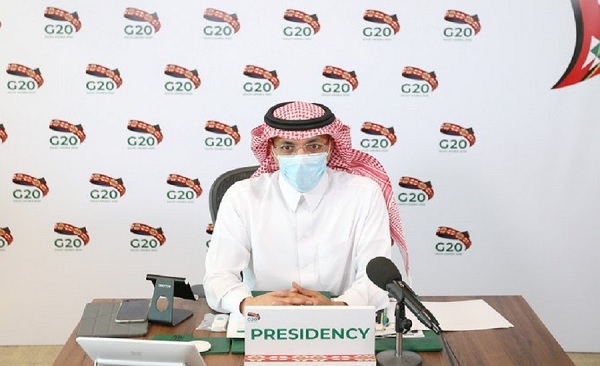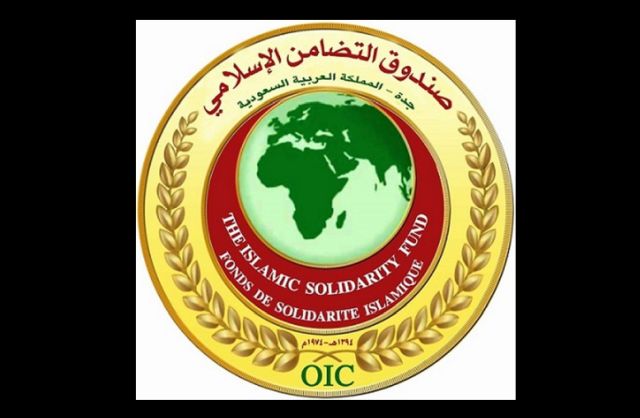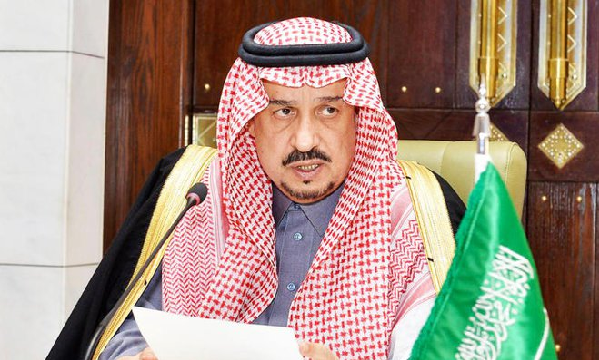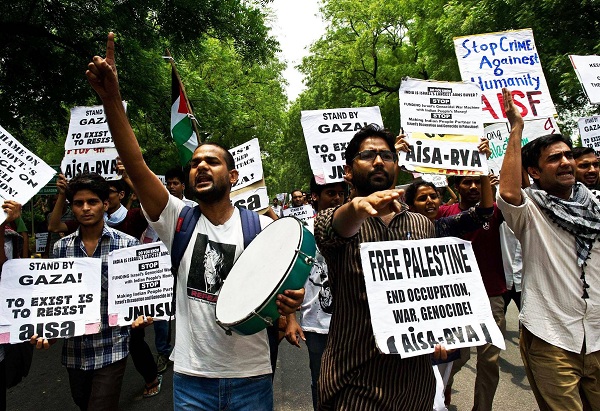
by admin | May 25, 2021 | Muslim World

Saudi Minister of Finance Mohammed Al-Jadaan attends a virtual meeting of G20 finance ministers and central bank governors in Riyadh on July 18, 2020.
Ghazanfar Ali Khan
RIYADH – The G20 under the current presidency of Saudi Arabia will consider extending a debt payments suspension program for the poorest countries as financial policymakers from the world’s biggest economies continue to take “exceptional measures” to support debt-ridden nations and expedite global economic recovery. This was announced here on July 18 following a virtual meeting of the G20 finance ministers and central bank governors.
Saudi Arabia’s finance minister Mohammed Al Jadaan and the Kingdom’s central bank governor Ahmed Al Kholifey chaired the virtual meeting. Saudi Arabia has taken a global leadership role in combating Covid-19 pandemic and it stands firmly in unison with the international community, especially with the G20 member states, to deal with this international crisis, said a report released on this occasion.
Al-Jaadan said: “The world is still living through Covid-19 and there is a lot of uncertainty around, but I am optimistic as always. Saudi has weathered an even worse oil crisis in the past and worse geopolitical situation in the past and …we recovered strongly, as this is not going to be an exception… We are watching what’s happening in the world,” Al Jadaan said, highlighting that the G20 group is prioritizing its efforts to support the global economic recovery.
Referring to the Debt Service Suspension Initiative (DSSI), a joint communique released by the G20 after the meeting, he said: “We will consider a possible extension of the DSSI in the second half of 2020, taking into account the development of the Covid-19 pandemic situation.” The G20 group has made progress on the DSSI, which runs until the end of 2020. A total of 42 countries have requested support so far under the scheme, amounting to the deferral of an estimated $5.3 billion in debt repayments, the group said.
The International Monetary Fund (IMF) and the World Bank Group will send a report to the G20 in October explaining the financial conditions of the countries eligible for debt relief. There is, however, a need for “further progress and [the G20] strongly encourages private creditors to participate in the DSSI on comparable terms when requested by eligible countries”, the communique added. It is important to note here that the G20 member states agreed in April this year to a time-bound suspension of debt service to deal with the Covid-19 pandemic.
The statement further said: “We are determined to continue to use all available policy tools to safeguard people’s lives, jobs and incomes, support global economic recovery, and enhance the resilience of the financial system, while safeguarding against downside risks.” Referring to the concerns raised by the World Bank that China, a member state of G20 and the largest creditor, was not participating fully, the G20 officials urged all bilateral creditors to implement the DSSI fully and honestly.
Saudi Arabia has already pledged $500 million to support global efforts to combat the pandemic. It has and urged other nations and organizations to help bridge an $8 billion financing gap. The Kingdom will also be providing SR10 million to help the Palestinians in the West Bank and Gaza Strip combat the coronavirus, according to an initiative by the King Salman Humanitarian Aid and Relief Center (KSrelief). On the institutional level, the Kingdom is collaborating with various local and international organizations to contain the spread of this disease. Saudi Arabia has provided $10 million to the World Health Organization (WHO) as part of its efforts to combat the novel coronavirus.
Meanwhile, Saudi Arabia’s Social Development Fund (SDB) has announced a package of more than $2.4 billion to help micro-enterprises and small businesses. The Saudi leadership has also taken care of its huge expatriate population, whose number exceeds 11 million including 2.7 million Indians living and working in Saudi Arabia. All expatriate workers have free access to the Kingdom’s health facilities for the treatment of coronavirus. They have also been exempted from paying a levy for renewal of their residence permits for several months.
All these measures and the generous allocations for funds have been commended by the international community, global organizations, and regional agencies. The Foreign Ministers of the Organization of Islamic Cooperation (OIC) member states hailed the efforts made by the Kingdom. On its part, the World Health Organization (WHO) praised Saudi Arabia for the financial aid it has granted to help international fight against the pandemic. Dr. Tedros Adhanom Ghebreyesus, WHO Director-General, expressed his appreciations for King Salman for his contribution of $500 million to support the world in its battle against Covid-19.

by admin | May 25, 2021 | Muslim World
 Jeddah : The Islamic Solidarity Fund (ISF) of the Organization of Islamic Cooperation (OIC) has approved financial assistance worth $1.490 for 37 development projects in some member states of the Arab Group.
Jeddah : The Islamic Solidarity Fund (ISF) of the Organization of Islamic Cooperation (OIC) has approved financial assistance worth $1.490 for 37 development projects in some member states of the Arab Group.
OIC Secretary General Dr. Yousef bin Ahmed Al-Othaimeen stated that the approved assistance is allocated for health, relief, education, development and culture projects. He noted that the ISF has always been a pioneer in providing aid for the good of the Islamic world peoples.
In Palestine, the ISF financial assistance goes to several projects including the Ahl-Al Khair Association, the Palestinian Anti-Drugs Association, Al-Ihsan Charitable Society, Patient’s Friends Society, Battir Charitable Society, the Hendaza Breda Village Council, Al Yamoun Municipality, Diabetes Friends Society, Working Women Society, Mojadidon Charitable Association for Youth Support, Palestinian Red Crescent Society, Fajr Association for Relief and Development, Sawaed Association for Relief and Development, Public Service Association for Gaza Neighborhoods, Hayfa Charitable Medical Center Association.
In Saudi Arabia, the ISF assistance goes to the Knowledge International Educational Foundation, Dar Al-Mawsoah Charitable Society and the Arab Urban Development Institute. The Fund assistance also covers the Youth Revival Charitable Organization, Afaq Al Majd Organization for Youth Welfare and Rehabilitation in Sudan, as well as the Islamic Committee of the International Crescent (ICIC) in Libya.
—AB/UNA-OIC

by admin | May 25, 2021 | Business Summit, Events, Muslim World
 Riyadh (IINA) – Riyadh Governor Prince Faisal bin Bandar on Sunday will inaugurate the 15th Trade Fair of Organization of Islamic Cooperation (OIC) which will kick off in Riyadh under the auspices of Custodian of the Two Holy Mosques King Salman.
Riyadh (IINA) – Riyadh Governor Prince Faisal bin Bandar on Sunday will inaugurate the 15th Trade Fair of Organization of Islamic Cooperation (OIC) which will kick off in Riyadh under the auspices of Custodian of the Two Holy Mosques King Salman.
The event is being organized by the Ministry of Commerce and Investment (MCI) in cooperation with the OIC, the Islamic Center for Development of Trade and the Council of Saudi Chambers at the Riyadh International Convention Center and Exhibition. “The Kingdom seeks to increase the level of trade exchange and promote two-way investments among OIC member states,” Turki Al-Toaimi, adviser to the minister of commerce and investment and its official spokesman, said here on Thursday. He expressed his deepest thanks and appreciation to Custodian of the Two Holy Mosques King Salman for his noble role in boosting the activities of the 15th OIC Trade Fair.
Al-Toaimi added that the trade fair will witness the participation of more than 30 OIC member states and the Kingdom’s pavilion will be the largest among OIC member states. A large number of Saudi companies and establishments will be displaying and offering a variety of goods and products made in Saudi Arabia, pointing out in the same context that Saudi products are currently being exported to more than 100 countries worldwide. Al-Toaimi said that the Kingdom seeks to increase its trade and investment with Islamic countries.
The 15th OIC Trade Fair is expected to witness the signing of a number of agreements and deals among OIC member countries and companies. A number of OIC ministers and ambassadors will participate in the trade fair, as well as businessmen and industrialists in and outside of the Kingdom. Al-Toaimi confirmed that the trade fair will provide various opportunities for businessmen to cooperate in various fields in private sector activities, such as finding new markets for their products and services, establishing joint ventures, providing new methods of funding for two-way trade, identifying available opportunities for cooperation in industrial projects, and expanding trade exchange among OIC member countries.
The OIC Trade Fair, held every two years, aims to introduce the products and services of OIC member states to raise the level of trade, promote two-way investments and open new markets for the products of participating countries. On the sidelines of the 15th OIC Trade Fair, the Council of Saudi Chambers and the Islamic Chamber will organize the 9th Forum for Businesswomen in Islamic Countries on Wednesday evening at its headquarters in Riyadh.

by admin | May 25, 2021 | Muslim World
 Jeddah, (IINA) – A recent report obtained by the International Islamic News Agency (IINA) on Sunday revealed that the number of the displaced people and refugees in member states of the Organization of Islamic Cooperation (OIC) during the year 2014 stood at 17,073,686 while compared to 12,693,075 in 2013, an increase of 34.5 percent with 4,380,611 more people.
Jeddah, (IINA) – A recent report obtained by the International Islamic News Agency (IINA) on Sunday revealed that the number of the displaced people and refugees in member states of the Organization of Islamic Cooperation (OIC) during the year 2014 stood at 17,073,686 while compared to 12,693,075 in 2013, an increase of 34.5 percent with 4,380,611 more people.
The report, published by the Islamic Cooperation Humanitarian Affairs Department (ICHAD-OIC), showed that this increase is an outcome of 45 crises and disasters that hit 27 member states including minorities in Myanmar and Central Africa. It also noted that some of those crises and disasters are still ongoing.
The report stated that 16 crises and wars occurred in 14 member states as well as in countries where Muslim are minorities such as Myanmar and Central Africa, have dislodged 15,703,259 refugees and displaced, while 1,370,427 were dislodged from 29 natural disasters occurred in 19 member states, in addition to Myanmar and Central Africa.
According to the ICHAD, Syria topped the number of refugees with an increase of 38.07 percent and now stood at 6.5 million, followed by Iraq’s 14.86 percent which stood at 2.53 million refugees, Nigeria 7.03 percent with 1.2 million, Somalia 6.44 percent with 1.1 million and Pakistan by 5.21 percent with 890,000 refugees.
The report also showed that more than 702,000 Muslims in Central Africa and 146,000 Muslims in Myanmar were dislodged as a result of crises and disasters.
The report highlighted that the number of displaced people because of crises rose to 15.73 million during 2014, which is 92 percent of all dislodged people, compared to 8.43 million in 2013, which was 66.4 percent of dislodged people in the previous year, while the number of displaced people by results of natural disasters dropped to 1.37 million during 2014, which is 8 percent of all dislodged people, compared to 4.24 million in 2013, which was 33.6 percent of dislodged people in the previous year.
Also, ICHAD predicted a further increase in number of this category, because of crises that surround member states such as Syria, Libya, Iraq, Yemen, Nigeria and other states, which are worsening the situation even more, calling for the need to strengthen the humanitarian aid system.
It was suggested in the report that OIC member states can further improve their performance in humanitarian aids through platforms that promote cooperation among the Islamic countries and humanitarian organizations.
ICHAD said that such platform will act as a mechanism to facilitate the development of common visions and strategies to face the humanitarian crises and disasters that are occurring member states, and that it will contribute to the advancement of humanitarian work in the Islamic World.





